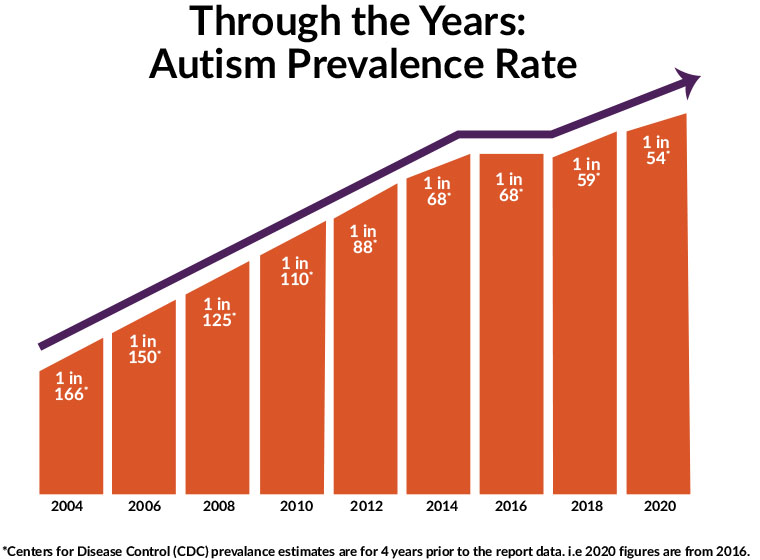The Centers for Disease Control and Prevention (CDC) released its new biennial data from the Autism and Developmental Disabilities Monitoring Network (ADDM) on the prevalence of autism in the U.S. The network identified 1 in 54 children as having autism spectrum disorder (ASD), representing a 10% increase from previous estimates.
In 8-year-old children, about 1.85%, or 1 in 54, were identified with ASD in 2016, based on tracking within 11 communities in the U.S. While these findings indicate that there continue to be many children living with ASD who need services and support, now and as they grow into adolescence and adulthood, they also offer good news that screening and awareness continue to identify children who will benefit from services.
Key Findings
- Boys were more than 4 times more likely to be identified with ASD than girls.
- For the first time, ADDM Network data found no overall difference in the number of black children identified with autism compared to white children. However, the number of Hispanic children identified with autism is still lower compared to white or black children.
- 74% of 4-year-old children with ASD in 2014 received a developmental evaluation by 36 months of age. This increased to 84% of 4-year-old children with ASD in the 2016 group.
In Arizona, key findings indicate that 1 in 63 8-year-old children were identified with ASD, whereas the previous Arizona prevalence was reported at 1 in 64 children; this estimate was slightly higher than the average number of children identified with ASD (1 in 59) in all areas of the U.S. where CDC tracks ASD.
“I am not at all surprised that the rates have increased since the last report,” says SARRC Vice President and Research Director Christopher J. Smith. “It’s important to remember the CDC generates these statistics based on their method of surveillance, which relies on data on only 8-year-old children from states that participate in this project. There is a lot of variability in rates from state-to-state, with some states reporting significantly higher rates or lower rates than Arizona.”
Smith shared that other methods of surveillance, like those that collect data from more than 100,000 families across the whole country and include children up to age 17, have reported higher rates than the CDC estimates. Further, surveillance projects in other countries have reported rates as high as 1 in 30.
Perhaps one of the most concerning statistics from this report is that only 68% of the children in Arizona were formally diagnosed with autism by the age of 8.
“This is troubling because we know the importance of early intervention. If children don’t have a diagnosis of autism, it’s unlikely they are getting treatment for autism. That means they are not getting effective, evidence-based, medically necessary treatment and it will be more difficult for them to reach their optimal level of functioning.”
The take-home message is there are a lot of people with autism in our communities who need our support. SARRC is committed to improving early detection methods and is working to make evaluations more accessible to families in Arizona. No one should be left in the dark about their child’s development, or told to wait for a year for their next appointment. Families need to move forward. Diagnosis is only the first step down a long road, and the earlier we identify kids, the better their trip will be,” Smith says.
Content source: National Center on Birth Defects and Developmental Disabilities, Centers for Disease Control and Prevention – read more here
Learn More About the Early Intervention Services Available at SARRC
- Do you suspect autism? Learn about SARRC’s Diagnostics Services Program »
- Attend Milestones, a free program offering information on developmental milestones for parents of infants ages 6 to 18 month: Learn more »
- Attend Free Online Family Orientation, which connects parents to current information and resources related to ASD: Learn more »

